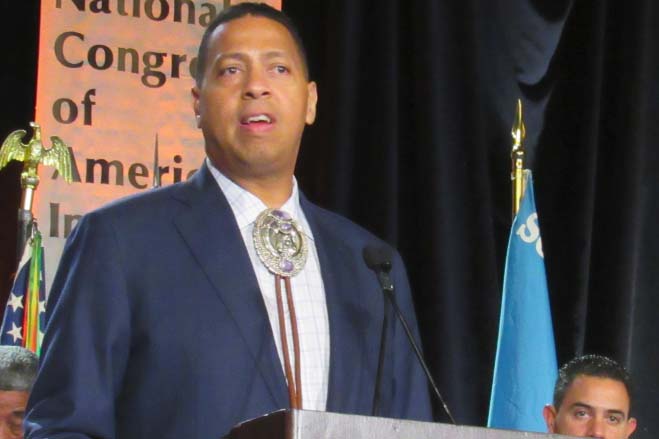
- Details
- By Darren Thompson
BOSTON, Mass. — On Monday, March 22, a federal grand jury returned a superseding indictment against former Mashpee Wampanoag Tribal Chairman Cedric Cromwell. Native News Online reported that Cromwell was arrested on Nov. 13 after an indictment by a federal grand jury for two counts of accepting or paying bribes.
The U.S. Attorney’s Office charged Cromwell and David DeQuarttro of Warwick, R.I., owner of an architecture firm used by the Mashpee Wampanoag Tribe for a casino project, on two counts of accepting or paying bribes as an agent (or to an agent) of an Indian tribal government and one count of conspiring to commit bribery.
Cromwell was also indicted on four counts of extortion under color of official right and one count of conspiring to commit extortion.
A superseding indictment usually happens when additional information has been found to justify additional charges in federal court. In this case, the United States Attorney returned to the grand jury to present new evidence. The result will be a new indictment under the original case number, which replaces the original indictment. Typically it will add additional defendants or additional counts against the original defendants.
Cromwell was charged with four additional counts of filing a false tax return, from years 2014 through 2017. The United States Attorney claims that Cromwell failed to report the bribes he received from his co-defendant DeQuattro. According to the indictment, Cromwell failed to report $39,000 in 2014; $57,374 in 2015; $26,884 in 2016; and $54,134 in 2017, for a total of $177,393.
Cromwell didn’t immediately respond to the additional charges, but in a previous interview with Native News Online he said that the legal actions against him were a Trump-era set up.
The Cape Cod-based Mashpee Wampanoag Tribe has faced years of legal setbacks for its planned First Light casino. The tribe gained federal recognition in 2007 and had more than 300 acres placed into federal trust and declared its reservation in 2016 under the Obama administration. During the Trump administration many Obama-era land designations were challenged, resulting in legal and political setbacks on the $1 billion casino.
The charge of filing a false tax return provides for a sentence of up to three years in prison, one year of supervised release and a fine of $100,000. Sentences are imposed by a federal district court judge based upon the U.S. Sentencing Guidelines and other statutory factors.
More Stories Like This
Native News Weekly (August 25, 2024): D.C. BriefsUS Presidents in Their Own Words Concerning American Indians
Native News Weekly (December 14, 2025): D.C. Briefs
Wounded Knee Massacre Site Protection Bill Passes Congress
Two Murdered on Colville Indian Reservation
Help us defend tribal sovereignty.
At Native News Online, our mission is rooted in telling the stories that strengthen sovereignty and uplift Indigenous voices — not just at year’s end, but every single day.
Because of your generosity last year, we were able to keep our reporters on the ground in tribal communities, at national gatherings and in the halls of Congress — covering the issues that matter most to Indian Country: sovereignty, culture, education, health and economic opportunity.
That support sustained us through a tough year in 2025. Now, as we look to the year ahead, we need your help right now to ensure warrior journalism remains strong — reporting that defends tribal sovereignty, amplifies Native truth, and holds power accountable.
 The stakes couldn't be higher. Your support keeps Native voices heard, Native stories told and Native sovereignty defended.
The stakes couldn't be higher. Your support keeps Native voices heard, Native stories told and Native sovereignty defended.
Stand with Warrior Journalism today.
Levi Rickert (Potawatomi), Editor & Publisher
